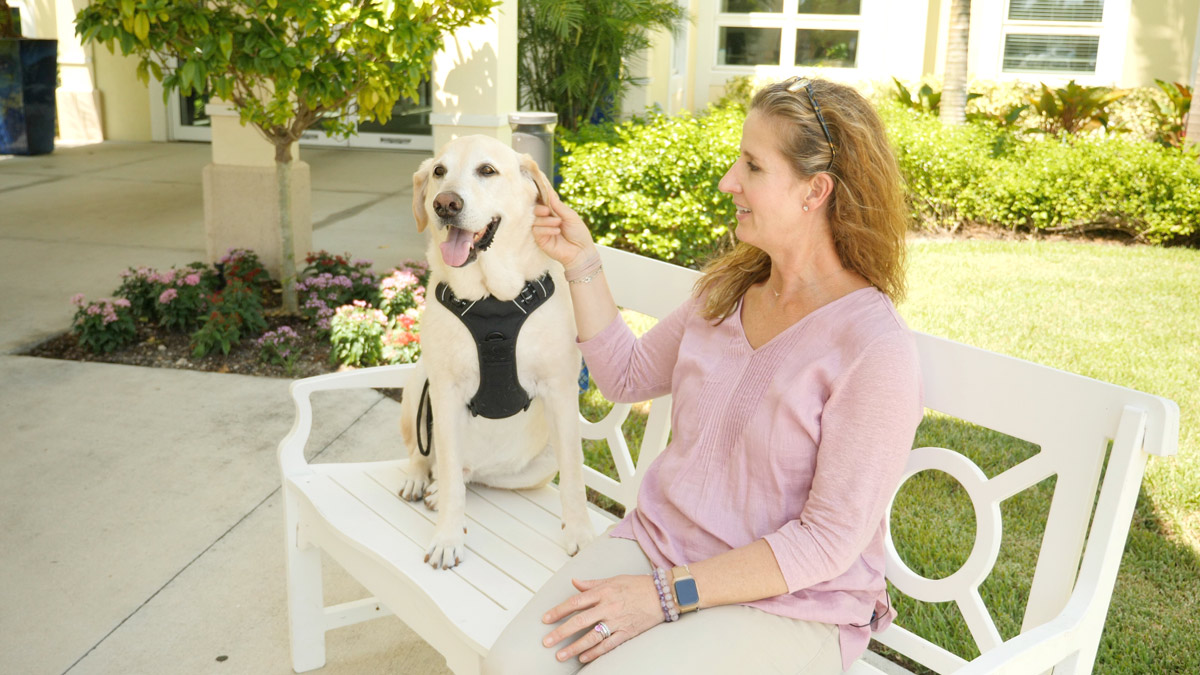
The Power of Pet Therapy in Senior Living
Have you ever encountered a dog that was happy to see you? Then when you stop to pet the dog, he or she gets excited and wags its tail in delight. In these moments, it’s nearly impossible to not smile and feel good.
The National Institute of Health says dogs can increase oxytocin – the warm, fuzzy feeling hormone – and lower levels of cortisol, the body’s main stress hormone.
Therapy dogs are the best at this, especially when it comes to senior care.
Pet therapy has quickly gained popularity among senior living communities offering memory care, like Palmview at Gulf Coast Village in Cape Coral.
Palmview residents and staff recently welcomed recreational therapist Stephanie Smith, and her therapy dog, Hunter, who moved to the area from Pennsylvania.
“Hunter has played a huge role in helping me to connect with the residents,” said Smith. “He provides a real calming effect, and they’re more likely to open up, share and engage which is really the goal.”
Smith specializes in dementia and cognition issues. She uses games, the environment, and Hunter to connect with residents, address their challenges and bring them joy.
Her trusty companion is an older yellow Labrador retriever, a popular therapy dog breed. She estimates Hunter is about 10 years old after she found him abandoned in the woods of her neighborhood.
“Hunter was the calmest, sweetest dog despite his condition,” said Smith. “He had a lot of ticks and needed medical care. He let everyone take good care of him and from that moment on he’s been my partner in crime and comes to work with me every day.”
Smith knew Hunter’s charm and gentle nature would make him a great therapy dog and a powerful tool for helping others.
Today, the four-legged staff member roams the halls of his new home at Palmview, providing comfort and cozying up to memory care residents.
“There have been many times where he gets on the resident’s bed, lays next to them, and provides comfort,” said Smith. “They like to talk to him. They’ll share their life and talk about the different pets that they’ve had.”
People with dementia or Alzheimer’s can become agitated so having a furry friend can promote positive mental stimulation.
Pet therapy can be a great way to calm an anxious resident, reduce the risk of depression and spark fond memories of loving pets from childhood.
Studies show an animal’s very presence can help reduce the impacts of dementia, such as anxiety, agitation, irritability, depression, and loneliness.
“Some of the folks have a lot of anxiety, loneliness or depression, but it’s so hard to be lonely or depressed when he’s looking at them as if they’re the only thing in the whole world that matters right now,” said Smith. “They’re able to connect and engage and share their feelings with Hunter, which helps me as a practitioner to really provide the highest level of care.”
In less than three months, Smith’s therapy dog has become a friendly face that residents look for and call by name each day, never missing a chance to spend time with Hunter whenever they can.
“While I’m out watering the garden, residents will come sit next to him and just chatter away,” said Smith. “It affirms his innate ability to touch people in ways that I really just can’t reach. There’s just something about looking into his eyes and sharing those moments where you just need a special loving pet to listen to what you have to say.”
With Smith’s specialty and Hunter’s unconditional love, the duo is making a positive impact on memory care residents at Palmview.
Hear more from ABC7 on how residents look forward to therapy dog visits.